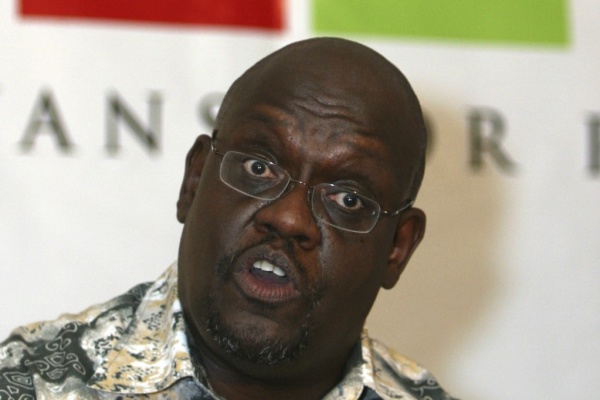Kenya‘s most prominent anti-corruption activist has warned that the country is “at a tipping point” as terrorist threats, declining revenues from tourism, and a lack of confidence in the government pile pressure on its leadership.
John Githongo, who exposed a £500m corruption scandal that implicated the former Kenyan president Mwai Kibaki and several senior politicians, said government corruption remained a serious and deepening problem.
Speaking to the Guardian at the UN Forum in London last week, Githongo said: “One feels concerned that we could tip either way, the politicians so far have not shown a competence to be able to handle all these balls in the air at the same time.”
A series of attacks have rocked Kenya in recent months, calling into question the government’s ability to stem terrorist activity. Security measures such as roadblocks and pat-downs are common, but Githongo says people fear the government is not doing enough to protect them.
“Kenyans have never been as insecure as they are right now, generally speaking,” he said. “We’ve never had less confidence in our government’s ability to deal with this insecurity – that is the most serious problem.”
Kenya’s president, Uhuru Kenyatta, has said the tourism sector, a crucial pillar of its economy, was “on its knees“, after western governments issued travel alerts urging foreign visitors to stay away from the country’s famous national parks and beaches for fear of terrorist attacks.
“Nairobi is a slightly tense place now,” Githongo says. “This tension is borne partly out of the violence we had in 2008, and this sense that with all that’s going on with al-Shabaab, with the government not seeming to know what it’s doing – making clueless statements, falling out with its traditional friends, the US and the UK – this gives you this sense that something bad is bound to happen.”
Pressure from Kenya’s traditional western allies to prosecute Kenyatta and his deputy, William Ruto, at the international criminal court over violence in the aftermath of the 2007 presidential elections has led Kenya to tighten diplomatic and economic ties with China.
At the end of a three-day visit to Kenya in May, China’s premier, Li Keqiang, agreed to finance 90% of a $3.8bn railway that will link Mombasa with Nairobi, and eventually connect Burundi, Rwanda, South Sudan and Uganda.
“Ever since we started engaging our Chinese colleagues in business, transparency has crashed, and that is causing considerable concern vis-a-vis corruption and its potential implications with regards to governance problems,” Githongo said.
But the country’s new constitution, a booming tech industry, discoveries of natural resources, a growing middle class, and investment in infrastructure, health and education are reasons to be optimistic about the future, he says.
“The new constitution is a sign that Kenya is moving in the right direction,” Githongo said. “But, at the same time, we’re seeing very important elements, or chunks, of this constitution being undermined very deliberately by the current government.”
Githongo, former head of the Kenya chapter of Transparency International, previously led the government’s anti-corruption taskforce. His struggle to expose political corruption is the subject of a book by British journalist Michela Wrong, which chronicles his dramatic flight from Kenya after he received death threats from people involved in his investigation.
Githongo says courageous Kenyans who speak out against the government, and ridicule its leadership, inspire him. He names the photojournalist Boniface Mwangi and rapper Juliani as young, politically aware people whom he admires.
Official regional integration in east Africa, long promised through multilateral organisations such as the East African Community, has stalled, but is beginning to happen informally, Githongo says.
“That [official] process is now stopping, partly because the integration is happening organically – in terms of business, in terms of free movement of people and goods and ideas,” he said. “At a people level, integration is moving way faster than the government level – governments are running to keep up.”
The quality of governance across Africa is increasing, says Githongo, who sits on the boards of the Africa Centre for Open Governance (Africog) and Freedom House, a press freedom and human rights watchdog.
But slippages in the fight against corruption have occurred in some African countries, he says, naming South Sudan, Central African Republic and the Democratic Republic of the Congo as states that have scaled back anti-corruption efforts.
Multinational corporations operating in the continent often fail to pay taxes, and trade within themselves, Githongo says, limiting revenues received by African governments.
“When one is talking about hitting the issue of tax avoidance and transfer pricing, one will find that the same institutions crop up when looking at terrorism finance, human trafficking, money laundering, drug trafficking,” he said, noting that an investigation into these institutions “could be the beginning of something important”.
Githongo is driven by the influence that corruption has on bigger problems. “I look at highly corrupt, fast-growing countries: Indonesia, Thailand, Kenya – very volatile; all the time [there are] coups, deaths, demonstrations.
“Corruption is ultimately causing poverty. It’s poisoning our politics. It’s increasing the level of violence in our politics. It’s causing Kenya – despite all our growth, the shiny buildings, all the nice cars – to head towards failure.”
